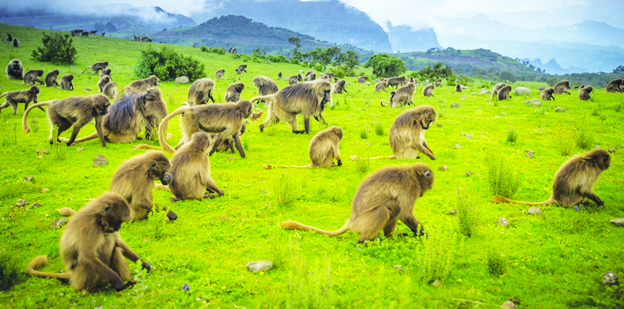
Ethiopia is a land blessed with rich and varied heritages. From over 80 different cultural traditions and fascinating religious festivals to ancient history, archaeological wonders and pristine natural endowments, the country truly possesses myriads of wealth potentials for tourism development.
Due to this fact, tourism sector of the country has been growing consistently over the past ten years in terms of tourist influxes and its investment has been keeping the pace with the growth in demand.
However, according to the World Travel and Tourism Council (WTTC) 2020 report, like other countries of the world, COVID-19 has been seriously affecting Ethiopia’s tourism sector. The report has revised its 2020 prospects for international tourist arrivals to a negative growth of 1 percent to 3 percent, down from an estimated growth of 3 percent to 4 percent forecast in early January 2020.
This could be translated into a loss of 30 to 50 billion USD in spending by international visitors (international tourism receipts).
Small and medium sized enterprises (which make up around 80 percent of the tourism sector) are expected to be particularly impacted. This might affect millions of livelihoods across the world, including vulnerable communities who rely on tourism as a vehicle to spur their livelihood and development.
According to Ministry of Culture and Tourism with regard to the impact of the epidemic on the sector, though the country inbound visitor forecasted about 1.4 million; the outbreak of the epidemic has lowered it and affected the sector negatively. The Ministry noted that the sector is known for employing many young people and women workforces. However, due to the COVID-19 outbreak, organizations engaged in the sector are compelled to shut down their business.
Ethiopia will have 1.6 million fewer passengers resulting in a USD 0.3 billion revenue loss, risking 327,062 jobs and 1.2 billion USD in contribution to Ethiopia’s economy.
The Ethiopian Airlines has exclusively reported income loss of over 500 million USD; occupancy rate of hotels, Meetings, Incentives, Conferences and Exhibitions (MICE) and accommodation is declined nearly to 0 percent, occupancy and Tour Operation Organization’s sold packages have canceled or postponed. To combat the impact of the epidemic, the Ministry has been working to develop Strategic Tourism Recovery Plan to support the sector, as the Ministry discovered.
It is said that the strategy is developed mainly to limit the current impacts through providing appropriate proactive responses for early mitigation of associated impacts and ensuring speedy recovery of stimulating tourism economy and labor demand.
According to the Ministry, the national tourism recovery strategic plan, which has three phases, response, recovery and resilience of tourism industry, will be effective till end of 2020 in normal condition with a probability of extension for additional 6 months.
The strategy is helpful to measure the impacts of the most affected segments of the society, tourist destinations and to determine incentive measurements to be implemented in coordination with the government and international partners.
The strategy is also curative to restrain the current impacts and get rid of potential impacts of the pandemic on the sector through proactive responses for early mitigation.
Minister Hirut Kassaw (Ph.D.) said that all states’ tourism bureaus will adopt the strategy as tourism roadmap and develop their own recovery plan in line with this strategy.
To promote the sector in a proper way, the Ministry will establish Tourism Recovery Media Coordination Center and to realize this, it will facilitate a budget of one million Birr. And through the help of media, the Ministry has planned to reach 30 million people.
Concurrent to this, the Ministry has put direction with regard to how the media disseminate consistent information. To this end, the ministry will undertake daily media monitoring and facilitate weekly press release, she added.
What is more, to support the most affected destinations, the Ministry will work in collaboration with different charity association and government institutions through undertaking in depth analysis as tourism services are very interdependent.
Equally, various measures would be taken to improve activities related to travel through facilitating finalized visa reform and establishing visitor information call centers, plus promoting East Africa Tourist Visa and electronic payment for entrance fee.
She underscored that to make the sector one of the best competitors, the Ministry will design and host events such as IGAD Tourism Day, African Universities Conference and domestic festivals and celebrations.
The Minister also reflected that a number of local and global media have put their projection that Ethiopia to be one of the best tourism destinations even at post COVID-19 exemplifying the report of Forbes Magazine.
She revealed that the magazine listed Ethiopia among the seven countries that will be the best tourism destination during post COVID-19 and her office will work to ensure this.
She stated that different projects like Sheger River Side and Entoto Projects that have been launched in the capital to exclusively enable Ethiopia to be one of the urban tourism hubs in the world.
The strategy was developed in cooperation with various technical taskforces and different professional associations.
It has also drawn input from the COVID-19 National Recovery Ministerial Level Working Group. From a robust review of various national and global socio-economic impact studies, journal of publications, articles, websites, UNWTO statistical reports and national level policies and strategies have been adopted. Comments were also received from policy meeting and tourism board, it was learnt.
Likewise, the experiences of many countries are also received through involving international experts via different communication tools.
The strategic document has a number of major strategic areas such as proactive communication and media engagement; support the struggling industry of the sector, cooperative image building and marketing among others.
The Ethiopian Herald June 24, 2020
BY TAMERU REGASA

